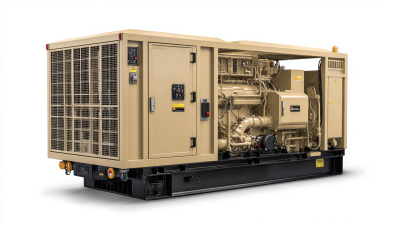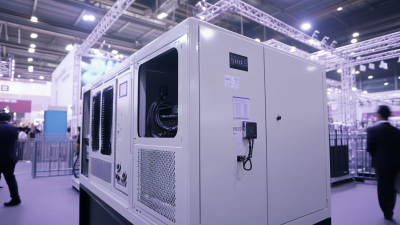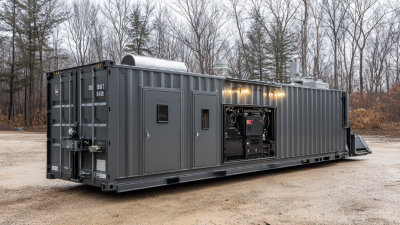
-
Home
-
Products
-
Service
-
About Us
-
Solution
-
Videos
-
News
-
Contact Us
Leave Your Message

In today’s fast-paced and energy-dependent business environment, selecting the right power solution is crucial for operational efficiency and reliability. A Generator 500 Kva stands out as a popular choice among businesses seeking a robust power supply, capable of supporting extensive electrical loads. According to recent industry reports, the global generator market is projected to reach $23 billion by 2027, highlighting the growing demand for reliable power sources across various sectors, including manufacturing, healthcare, and telecommunications. Moreover, with interruptions in power supply increasingly disrupting operations, businesses are prioritizing the acquisition of industrial generators to ensure seamless continuity. This blog will delve into seven essential tips for choosing the right Generator 500 Kva tailored to your specific business needs, ensuring you make an informed decision that optimizes performance and reliability.

When selecting a 500 kVA generator for your business, understanding your power requirements is paramount. Start by assessing the total energy consumption of all electrical devices you plan to power. This involves adding up the wattage of essential equipment, ranging from computers and lighting to industrial machinery. Be sure to account for both running watts and starting watts, as some devices require a higher wattage to start than they do to operate continuously.
Next, consider future growth. If you anticipate expanding your operations or adding new equipment, it's wise to choose a generator that can accommodate potential increases in power needs. This ensures you won’t be caught off guard as your business evolves. Additionally, consulting with an electrical engineer or a professional generator supplier can provide valuable insights and help you avoid common pitfalls, ensuring that the generator you choose will meet your specific energy demands reliably and efficiently.
When selecting a 500 KVA generator for your business, understanding the pros and cons of diesel versus gasoline options is crucial. The global diesel generator market was valued at USD 19.46 billion in 2023 and is expected to increase significantly, projecting a market size of USD 37.03 billion by the early 2030s. Diesel generators are favored for their efficiency and durability, making them ideal for businesses that require continuous power. Their robust performance is supported by an anticipated growth at a CAGR of 8.1% from 2025 to 2034, primarily driven by the rising demand for reliable energy solutions across various sectors.
In contrast, the gas-fired generator market is also on the rise, valued at USD 292.6 million in 2024 and expected to expand to USD 702.5 million by 2034. Gasoline generators tend to be more flexible and quieter than their diesel counterparts, making them suitable for smaller applications or settings where noise is a concern. As businesses weigh these options, the choice between diesel and gasoline generators will depend on specific operational needs, power requirements, and environmental considerations, alongside monitoring market trends that highlight the opportunities each fuel type presents in the evolving energy landscape.
| Type | Fuel Type | Power Output (kVA) | Efficiency (%) | Maintenance Cost ($/year) |
|---|---|---|---|---|
| Open Frame Generator | Diesel | 500 | 85 | 1200 |
| Enclosed Generator | Gasoline | 500 | 80 | 1500 |
| Hybrid Generator | Diesel & Gasoline | 500 | 90 | 1800 |
| Portable Generator | Gasoline | 500 | 75 | 1000 |
When selecting the right 500 KVA generator for your business, fuel efficiency should be a key consideration, as it directly impacts your operational costs. According to a report by the U.S. Department of Energy, industrial generators that operate at higher efficiency ratings can save businesses up to 20% in fuel costs annually. This means that investing in a generator that not only meets your power needs but also utilizes fuel more effectively can translate to significant long-term savings.

Furthermore, advancements in generator technology have led to the introduction of models featuring advanced fuel management systems. These systems optimize fuel consumption based on load demand. A study by the National Renewable Energy Laboratory indicates that generators equipped with such systems can improve fuel efficiency by as much as 15%. By choosing a 500 KVA generator with these capabilities, businesses can enhance their sustainability efforts while reducing their overall energy expenditures. Remember, the initial cost of a generator should be weighed against its long-term fuel efficiency to ensure you are making a financially sound investment.
When selecting a 500 kVA generator for your business, noise levels are a crucial element to consider, especially in urban or residential areas where compliance with local regulations is mandatory. Generators can produce significant noise, which might disrupt the surrounding environment and lead to complaints or even legal action. Therefore, reviewing the noise output of potential generator models is essential to ensure they conform to the necessary standards.
Most jurisdictions have specific noise regulations that limit the decibel levels that generators can emit during operation. When looking for a generator, it’s vital to assess its noise rating, often measured in decibels (dBA) at a distance of 7 meters. Choosing a model that operates below these limits will not only foster good relations with neighboring businesses and residents but also enhance your company’s reputation as a responsible entity. Opt for generators equipped with soundproof enclosures or advanced muffler systems designed to minimize noise, ensuring your operations remain compliant while maintaining a productive work environment.
This chart compares the noise levels of different 500 KVA generators. It's essential to consider compliance standards when selecting a generator for your business needs.
When selecting a 500 KVA generator for your business, maintenance requirements play a crucial role in ensuring long-term reliability and performance. To avoid unexpected downtimes and costly repairs, it's essential to understand the maintenance schedule and demands of the generator. Regular servicing, including oil changes, filter replacements, and inspections of electrical components, ensures that the generator runs smoothly and efficiently. Additionally, a generator that is easy to access for maintenance tasks can significantly reduce labor costs and time spent on preventive measures.

Furthermore, consider the availability of spare parts and support services when choosing a generator. A brand that provides comprehensive maintenance packages or has a robust service network can enhance the longevity of your equipment. It’s also wise to invest in employee training for basic maintenance tasks, fostering a proactive approach to equipment care. By prioritizing maintenance requirements in your selection process, you can secure a reliable power source that meets your business's needs and minimizes operational disruptions over time.





